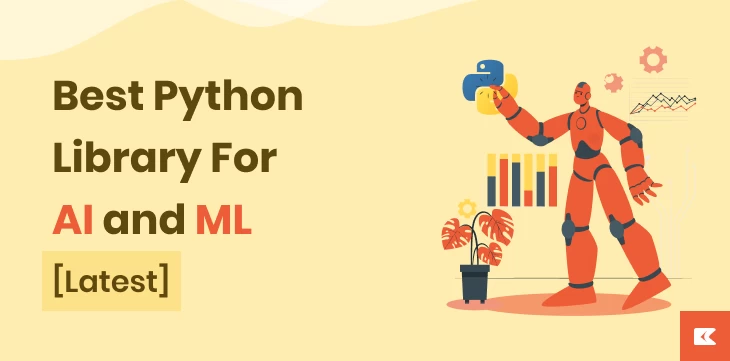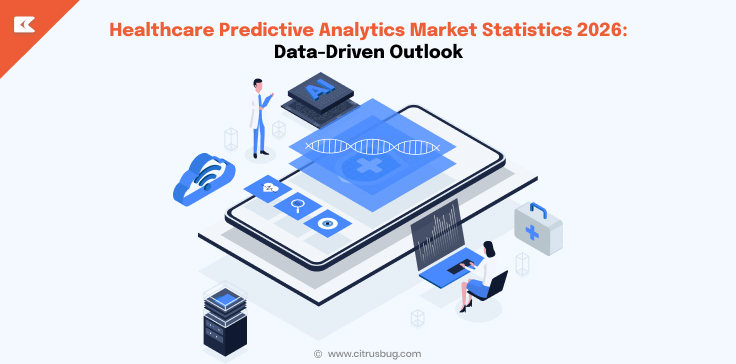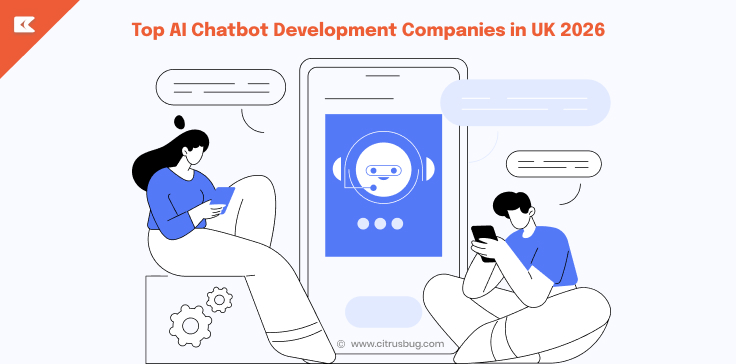
The demand for Python development services is ever-increasing, and rightfully so. Python is a powerful language that is highly versatile and has numerous use cases for diverse market needs. From software development to web app development to game development and more, Python can be leveraged to create reliable digital solutions.
Another significant sphere where Python is shining in the current times is Machine Learning and Artificial Intelligence. ML and AI are cutting-edge technologies that are highly prevalent due to their terrific data analysis and data processing capabilities.
Today, businesses truly understand the value of data. As a result, they want resources for their enterprise that can dig deep into the data and derive valuable information from it. Here is where AI and ML apps come into play and help process the data in-depth.
The generated insights help lower production costs, increase productivity, and enhance business efficiency. Not many people know, but these AI and ML apps work because they are powered and backed by various Python libraries.
Hence, in this blog, we will explore various Python libraries that power ML and AI apps and help them bring a substantial difference to several industries.
What are Python Libraries?
Python libraries are the collection of precompiled codes built for specific, well-defined operations in a program. These codes are usually developed for general operations of a program that stays the same in various applications such as login pages, calendar features, social media integrations, etc.
Apart from the pre-compiled codes, libraries of Python also consist of configuration data, templates, documentation, classes, values, etc. This collection of bundled codes makes programming convenient and simpler for the developer as they can skip creating similar functions that serve the same purpose repeatedly.
Python libraries are extremely beneficial in bringing success to almost all Python development services. For companies offering Machine learning consulting services and MLops consulting services, these libraries are indispensable tools for creating robust, scalable solutions.
How do Python Libraries Function?
Different Python development companies leverage different ways to link libraries with Python programs, depending on their software platform. For instance, in the MS Windows environment, Python libraries have a DLL extension (Dynamic Load Libraries) that is used to link the program to the AI Python library.
When the program is executed, the linker automatically looks for the library extension and further extracts the functionalities of that particular library to get the program working. However complex your program may be, Python libraries provide a great way to ease the development process for developers.
What is the Role of Python in ML and AI?
You must be wondering, there are countless programming languages, but why do businesses only hire Python developers to build apps for ML and AI programs? The following reasons will help you comprehend why it is so:
Python is a Combo of Power and Flexibility
Python is based on OOPs (object-oriented programming language) concepts. It means that it is extensible and can use several repositories and libraries. Apart from that, Python consists of numerous automation and interaction tools that make it powerful and functional to create intelligent automation tasks.
Python has Exhaustive Libraries
One of the reasons everyone wants to hire Python developers and the surging demand for the language is the availability of thousands of Python libraries.
You can find a Python library for almost every existing problem on the planet, making your program development swifter, and easier, and ensuring smooth program implementation and integration.
Open Source Language with an Easy Learning Curve
Python is an open-source language readily available to anyone who wants to learn it. Moreover, natural language processing offers easy readability and has a simple syntax structure that beginners can easily understand.
Being an easy and effective language to learn, it is preferred by a vast number of application developers worldwide.
Backing of Vast Python Community
Python is one of the top-growing languages in the world. Not only Python developers but Python development services globally have quadrupled in the recent few years.
This surge in the number of Python developers has extended the support for the extensive Python community, which is always active and eager to work on new problems and use Python to better the digital world and businesses.
What are the Top Python Libraries Used in ML and AI?
Python libraries play a significant role in making ML and AI the technologies they are today. Here are some of the well-known Python libraries that are leveraged in the development of Machine Learning and Artificial Intelligence applications:
1. Numpy
It is a popular Python library used to handle multi-dimensional data and complex mathematical functions being used on the data. The NumPy library powers the speed of computation of mathematical expressions and execution of complex functions working on arrays.
Key Features:
- Shape manipulation.
- Discretion of Fourier transformations.
- Statistical operations and linear algebra.
- Support for n-dimensional arrays.
- Data cleaning and manipulation.
- Random simulations.
2. Pandas
Pandas is a prominent Python library for Machine Learning concepts. It is a data analysis library that analyses and manipulates the data. Pandas make it easier for developers to work with structured multidimensional data and time series concepts and produce efficient results.
Key Features:
- Data alignment and handling of missing data.
- Merging and joining of datasets.
- Dataset reshaping and pivoting.
- Data filtration.
- Data manipulation and analysis.
- Indexing of the data.
3. Matplotlib
It is a data visualization library used for designing plots and graphs. The library itself is an extension of SciPy and handles complex data models of Pandas as well as NumPy data structures. Matplotlib offers features such as Basemap, GTK tools, Cartopy, Mplot4d, etc., that help in generating image plots, 3D plots, contour plots, and more.
Key Features:
- High-quality diagrams, plots, histograms, graphs, etc.
- Intuitive and easy to use.
- GUI toolkit support.
- Map projections.
- Recognition of data patterns.
4. SciPy
It is a Python library that originates from NumPy. SciPy is leveraged by Python development services to perform technical and scientific computing on large sets of data. The library has built-in array optimization and linear algebra modules that help in scientific analysis and engineering.
Key Features:
- Array manipulation subroutines.
- User-friendliness.
- Data visualization and manipulation.
- Scientific and technical analysis.
5. Scikit-learn
It is a powerful Python library that was originally generated to serve the purpose of data modeling and building machine learning algorithms. It has a simple, engaging, and consistent interface that is exceptionally user-friendly, making it easy to use and share data.
Key Features:
- Data modeling.
- End-to-end Machine Learning algorithms.
- Model selection.
- Classification of data.
- Dimensionality reduction.
- Pre-processing of the data.
6. TensorFlow
It is an open-source library used for reaching data and production purposes. The library is offered by Google and can be used to make ML model building easier. TensorFlow offers a flexible framework and architecture that enables it to run on various computational platforms. However, it has its tensor processing unit (TPU) through which the best results can be obtained.
Key Features:
- Creating deep learning models.
- Natural Language Processing.
- Abstraction capabilities.
- Managing deep neural networks.
- Image, text, and speech recognition.
7. Keras
It is an open-source Python neural network library that is offered as an extension to the TensorFlow library. Keras is designed for building and evaluating neural networks within machine learning and deep learning models. The library is flexible, modular, and extensible and can be integrated with objectives, optimizers, layers, and activation functions.
Key Features:
- Activation and cost functions.
- Data pooling.
- Developing neural layers.
- Batch normalization.
- Building deep learning models.
8. Theano
It is a highly prevalent Python library utilized by several Python development companies to evaluate complex mathematical expressions. It is purposely developed for Machine Learning technology and enables efficient optimization and evaluation of matrix calculations. Theaono can be integrated with NumPy to increase the computation speed by 140 percent.
Key Features:
- Faster and stable evaluations.
- High-performing mathematical computations.
- Data-intensive calculation.
- Working with multidimensional arrays.
9. PyTorch
Highly popular production-ready Python libraries for Machine Learning concepts. The library supports GPU acceleration and provides performance optimization to deep neural networks. PyTorch is mostly used for boosting the performance of deep learning frameworks and is supported by a vast Python community.
Key Features:
- Development of deep learning models.
- Matrix-vector multiplication.
- Statistical distribution and operations.
- Greater control over datasets.
Conclusion
Python libraries are highly beneficial when working with ML and AI technologies. This is especially true for an AI chatbot development company, where these libraries enable the development of chatbots that not only respond to user inputs but also learn and improve over time, providing more accurate and human-like interactions.
That is why the demand to hire a leading Python development company is expanding with each passing day. Here at Citrusbug, we have a team of Python experts who are passionate and understand the intricacies of the Python programming language to develop capable ML and AI applications.





 SaaS Development
SaaS Development Web Application Development
Web Application Development Mobile Application Development
Mobile Application Development Custom Software Development
Custom Software Development Cloud Development
Cloud Development DevOps Development
DevOps Development MVP Development
MVP Development Digital Product Development
Digital Product Development Hire Chatbot Developers
Hire Chatbot Developers Hire Python Developers
Hire Python Developers Hire Django Developers
Hire Django Developers Hire ReactJS Developers
Hire ReactJS Developers Hire AngularJS Developers
Hire AngularJS Developers Hire VueJS Developers
Hire VueJS Developers Hire Full Stack Developers
Hire Full Stack Developers Hire Back End Developers
Hire Back End Developers Hire Front End Developers
Hire Front End Developers AI Healthcare Software Development & Consulting
AI Healthcare Software Development & Consulting Healthcare App Development
Healthcare App Development EHR Software Development
EHR Software Development Healthcare AI Chatbot Development
Healthcare AI Chatbot Development Telemedicine App Development Company
Telemedicine App Development Company Medical Billing Software Development
Medical Billing Software Development Fitness App Development
Fitness App Development RPM Software Development
RPM Software Development Medicine Delivery App Development
Medicine Delivery App Development Medical Device Software Development
Medical Device Software Development Patient Engagement Software Solutions
Patient Engagement Software Solutions Mental Health App Development
Mental Health App Development Healthcare IT Consulting
Healthcare IT Consulting Healthcare CRM Software Development
Healthcare CRM Software Development Healthcare IT Managed Services
Healthcare IT Managed Services Healthcare Software Testing services
Healthcare Software Testing services Medical Practice Management Software
Medical Practice Management Software Outsourcing Healthcare IT Services
Outsourcing Healthcare IT Services IoT Solutions for Healthcare
IoT Solutions for Healthcare Medical Image Analysis Software Development Services
Medical Image Analysis Software Development Services Lending Software Development Services
Lending Software Development Services Payment Gateway Software Development
Payment Gateway Software Development Accounting Software Development
Accounting Software Development AI-Driven Banking App Development
AI-Driven Banking App Development Insurance Software Development
Insurance Software Development Finance Software Development
Finance Software Development Loan Management Software Development
Loan Management Software Development Decentralized Finance Development Services
Decentralized Finance Development Services eWallet App Development
eWallet App Development Payment App Development
Payment App Development Money Transfer App Development
Money Transfer App Development Mortgage Software Development
Mortgage Software Development Insurance Fraud Detection Software Development
Insurance Fraud Detection Software Development Wealth Management Software Development
Wealth Management Software Development Cryptocurrency Exchange Platform Development
Cryptocurrency Exchange Platform Development Neobank App Development
Neobank App Development Stock Trading App Development
Stock Trading App Development AML software Development
AML software Development Web3 Wallet Development
Web3 Wallet Development Robo-Advisor App Development
Robo-Advisor App Development Supply Chain Management Software Development
Supply Chain Management Software Development Fleet Management Software Development
Fleet Management Software Development Warehouse Management Software Development
Warehouse Management Software Development LMS Development
LMS Development Education App Development
Education App Development Inventory Management Software Development
Inventory Management Software Development Property Management Software Development
Property Management Software Development Real Estate CRM Software Development
Real Estate CRM Software Development Real Estate Document Management Software
Real Estate Document Management Software Construction App Development
Construction App Development Construction ERP Software Development
Construction ERP Software Development






